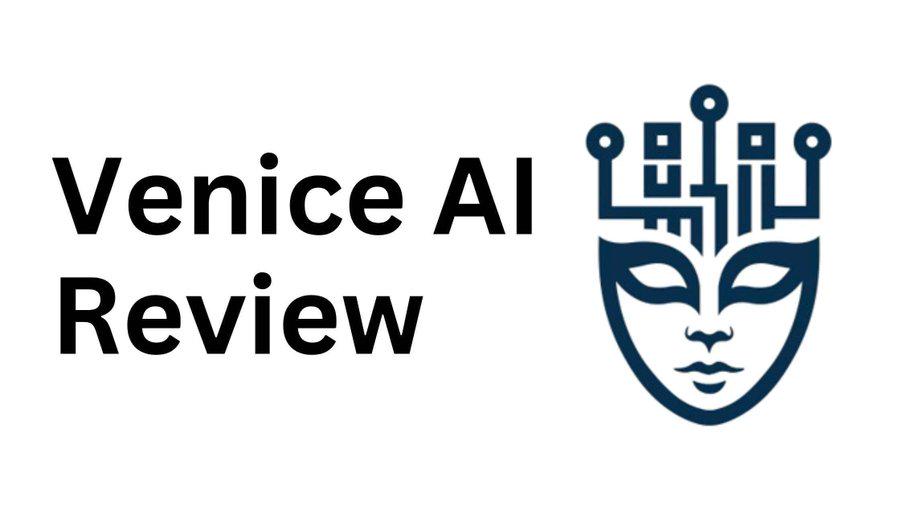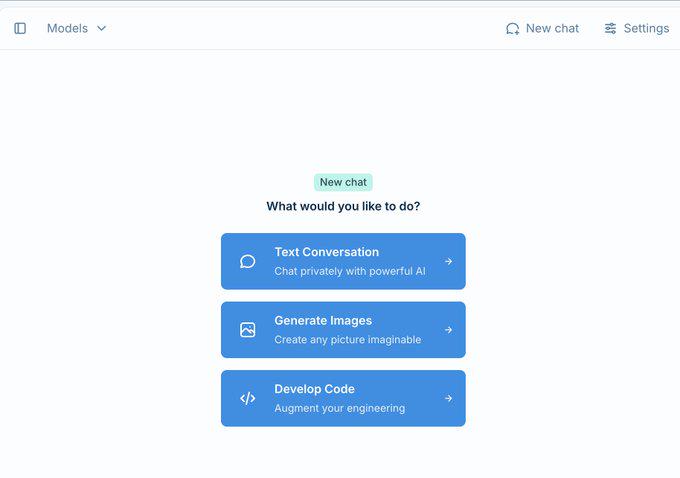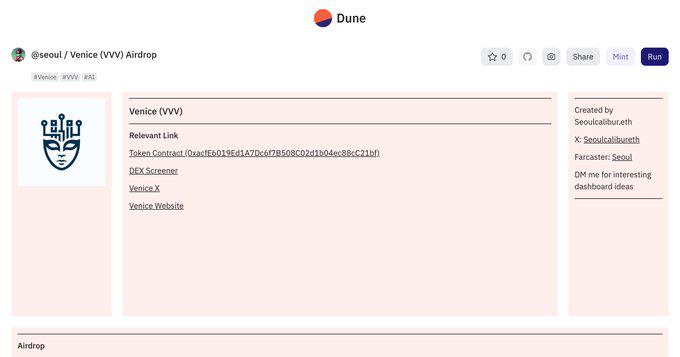
Author: XinGPT
A quick review of Coinbase’s new Base AI project - Venice @AskVenice , which was launched today.
Venice AI is an artificial intelligence platform with privacy protection, decentralization and censorship-free as its core. It was founded in 2024 by ShapeShift founder Erik Voorhees. The underlying layer integrates large open source models including the popular Deepseek.
Technical features
Decentralized architecture
Built on the Ethereum Layer 2 network Base, it uses blockchain technology to ensure data security and decentralized processing, reducing dependence on traditional intermediaries.
Requests are processed through a distributed GPU network (such as Akash), avoiding the central server from storing user data, and all conversation records are only saved on the user's local device.
Open Source Model Integration - DeepSeek is now supported!
It uses open source models such as Meta's Llama 3.3 (text generation), Deepseek, and Stable Diffusion (image generation) to support the community's continuous improvement of technology. It provides a custom model training function, and users can upload data sets to adjust parameters to meet personalized needs.
Privacy protection mechanism
Zero data retention: No user questions or generated content are stored, only the IP address is required (which can be hidden through VPN), and anonymous registration is supported.
Localized processing: Tasks such as image generation and code debugging are completed on user devices first to reduce the risk of data leakage.

Core Features
Multimodal generation capabilities
Text generation: supports uncensored conversations, document summarization, creative writing, etc., with response speed comparable to mainstream AI.
Image generation: Provides 70+ style templates, supports high-resolution output (Pro version has no watermark), and generates up to 1,000 images per day312.
Code Assist: Generate code snippets, debug programs, and support file upload analysis.
Documentation and data analysis
It supports PDF document parsing, automated data visualization, and sensitive research project processing, and is suitable for scenarios that require confidentiality.
API and Extensibility
Pro users can access the API to integrate into third-party tools or workflows, and customize system prompts to adjust AI behavior.
Core Advantages
Privacy and No Censorship
Different from mainstream AI platforms (such as ChatGPT), it has no content filters and allows free expression, which is particularly attractive to users who are concerned about privacy.
Local storage and blockchain technology ensure that data sovereignty belongs to the user and avoids corporate monitoring.
Flexible business model
Free version: 25 text interactions + 10 image generation per day, suitable for light users.
Pro version: monthly fee of 8 (or annual fee of 149), provides unlimited text, 1,000 images/day, HD export and the option to remove the security mode, which is cost-effective.
Community-driven and transparent
50% of VVV tokens are allocated to users and the AI community, incentivizing ecosystem participation through token economics, and an annual inflation rate of 14% is used for API expansion.
Open source code allows for third-party review, increasing trust.
Potential challenges
Content risks: The lack of a review mechanism may lead to the spread of misleading information or misuse of generated content (such as adult content), requiring user self-discipline.
Functional limitations: Relying on open source models, some capabilities (such as complex logical reasoning) are weaker than closed-source competitors.
User experience: Although the interface is simple, advanced functions (such as model training) have a high threshold for non-technical users.
Token Mechanism
The total number of VVV tokens is 100 million. The main function is that token pledgers can increase the capacity of inference according to the amount of pledge. The more the token is pledged, the more times the inference can request the API. There is a 7-day cooling-off period for withdrawal after staking.
25 million tokens will be distributed to 100,000 early users of Venice;
25 million airdrops to eligible Base users, including Virtuals and Agent holders such as Luna and VaderAI.
The airdrop is based on the snapshot of December 31st; the deadline for claiming is March 13th, and there is no pre-sale of VVV tokens. ( Query page address )

The remaining tokens are distributed as follows:
35 million tokens (35% held by Venice, 10 million allocated to the team (24-month linear release).
10 million tokens (10%) for the Venice Incentive Fund.
5 million tokens (5%) are used for liquidity deployment on Base DEX Aerodrome.
User data and related links
Since its launch in May 2024: 400,000 registered users, 50,000 daily active users (DAU), and 15,000 inference requests per hour.
( Airdrop collection details ) (As of press time, 6.5 million VVVs have been collected)











